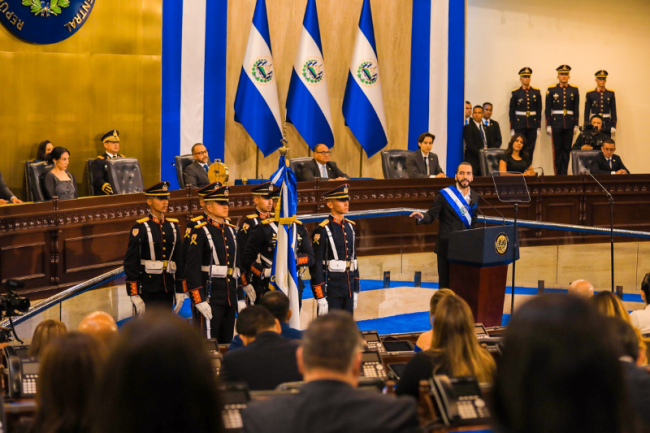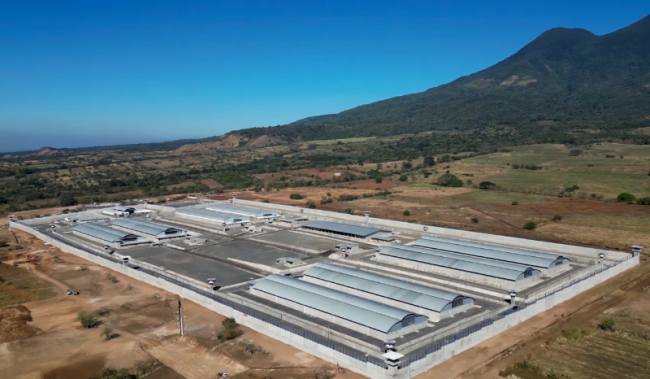
On August 6, a new group in the U.S. House of Representatives, the El Salvador Caucus, sent a letter to Secretary of State Antony Blinken requesting that the State Department remove the elevated travel advisory status for El Salvador, its first official correspondence aimed at influencing U.S. policy towards El Salvador. The caucus—formally announced on July 8 by Florida Republican and vocal Trump supporter Representative Matt Gaetz, who co-chairs the caucus alongside Texas Democrat Vicente Gonzalez—emerged as increasing numbers of international headlines report on widespread human rights violations under Salvadoran President Nayib Bukele’s militarized state of exception, which has suspended many basic civil liberties nationwide for over two years in a so-called “war against gangs.”
Like other congressional caucuses, the El Salvador Caucus has no authority within Congress other than to advance a common interest. The caucus’ stated mission is to promote “a better understanding of issues related to the United States’ relationship with El Salvador, our mutual interests and the interests of the United States.” In Gaetz’s words, however, “The El Salvador Caucus will exist to… encourage the strong reforms that President Bukele has put into effect” and “vindicate the choices President Bukele has made.” The caucus’ early actions and Gaetz’s statements suggest the group’s role is not only to boost the image of Bukele but also to drive the agenda of the Bukele government within the United States.
The El Salvador Caucus’s founding came on the heels of Bukele’s inauguration for an unconstitutional second term on June 1, 2024. Of the six members of the U.S. Congress who traveled to El Salvador for the ceremony—Representatives Matt Gaetz (R-FL), Maria Elvira Salazar (R-FL), Vicente Gonzalez (D-TX), Adriano Espaillat (D-NY), Lou Correa (D-CA), and Senator Mike Lee (R-UT)— four are now part of the 13-member caucus, including bipartisan co-chairs Gaetz and Gonzalez. The members appear to have traveled to San Salvador separately from the official U.S. delegation sent by the Biden administration, led by Secretary of Homeland Security Alejandro Mayorkas. In addition, Politico reported on an unofficial MAGA delegation led by Donald Trump, Jr. and Tucker Carlson. Following the swearing-in, the members of Congress and U.S. Ambassador William Duncan joined Bukele at a lake house meeting.
Weeks earlier, in May 2024, representatives of El Salvador’s Minister of Foreign Affairs held a series of meetings with members of Congress, including Representative Espaillat and Senator Lee, both of whom traveled to El Salvador for the inauguration—the formalization of what many in El Salvador are now calling the de facto government. Salvadoran news outlet El Faro has reported that Bukele’s government hired lobbyists who courted some of these same congressional offices, as well as high-profile conservative voices in the United States. No outside source of funding for the members’ travel is immediately apparent; public databases from the House and Senate listing disclosures of privately sponsored travel show no filings.
Shortly after his election in February, Bukele traveled to Washington to address the far-right Conservative Political Action Conference (CPAC). Weeks later, Republican Senator Marco Rubio, ranking member of the Western Hemisphere subcommittee of the Senate Foreign Relations Committee, visited Bukele in San Salvador and published an op-ed praising the president and calling for increased trade between the two countries.
Human Rights Abuses Trumped by Anti-Immigrant Messaging
The caucus launched amid damning reports of widespread and systematic human rights abuses, including documented crimes against humanity, committed under El Salvador’s state of exception. According to a July 10 report by the Salvadoran human rights organization Cristosal, “Two years into what was supposed to be a temporary emergency measure... at least 265 people have died in state custody [including four infants].” Cristosal presents evidence of “arbitrary detentions, torture, and deaths that raise serious concerns about the potential commission of crimes against humanity by the Salvadoran State.” A July 16 Human Rights Watch report highlights the plight of detained children, who “have often faced overcrowding, lack of adequate food and health care, and have been denied access to their lawyers and family members.”
Another story that recently dominated the news in El Salvador was the testimony of Fidel Zavala, a businessman detained for 13 months facing fraud charges, of which he was acquitted. After his release, he described the systematic torture he witnessed in prison, including many deaths in state custody. On July 17, lawyers from the Human and Community Rights Defense Unit (UNIDEHC) accompanied Zavala to file an unprecedented complaint with the Attorney General’s Office against the director of prisons, Osiris Luna.
Days later, Gaetz and three fellow Republican members of the El Salvador Caucus traveled to El Salvador to meet with Bukele, celebrating the very policies that led to these abuses. During that visit, the group met with the minister of justice, who is also the subject of a legal complaint filed by UNIDEHC, as well as with representatives of the National Civil Police. They also toured the Terrorist Confinement Center (CECOT), a mega-prison built during Bukele’s first term.

The prison, which the government claims can house up to 40,000 inmates, has become a mainstay of Bukele’s propaganda videos touting the state of exception. The government has reported over 80,000 arrests under the measure, which permits arrest without warrants, often carried out via anonymous tips and at police and military discretion. As a result, El Salvador now has the highest incarceration rate in the world. Nearly 2 percent of the adult population is in prison, and tens of thousands have yet to face trial. During the tour, Gaetz, dressed in all black and sporting black sunglasses, gestured to overcrowded prison cells, each with an armed guard at its door, as he praised Bukele’s incarceration policies.
This CECOT tour also took place days after Republican presidential nominee Donald Trump questioned the success of Bukele’s state of exception in his speech at the Republican National Convention, accusing him of reducing crime in El Salvador by “sending criminals” to the United States. The moral panic over gang members fleeing Bukele’s state of exception is not new; politicians from Bukele’s own party have offered a similar anti-immigrant message. Gaetz, however, praised Bukele’s mass incarceration policy with anti-immigrant fervor of his own, claiming, “a lot of the people behind [prison bars] would’ve found a way to make their way to the United States and harm Americans.”
Contrary to Gaetz’ suggestion, migration from El Salvador has continued under Bukele, driven by a failing economy and aggravated by the imminent threat of arbitrary arrest. There has also been a drastic rise in political persecution. According to Salvadoran human rights expert Celia Medrano, “Internal displacement and forced migration are growing significantly in number, with people leaving the country requesting asylum and refuge, claiming that they are fleeing state violence carried out by police and military officers.” Among the growing number of asylum petitions filed by Salvadorans around the world are many examples of opposition journalists, activists, and community and political leaders now living in exile.
Appeal to the State Department
On August 17, Bukele published a video of a visit from yet another influential right-wing U.S. actor in international politics: Erik Prince, the founder of the infamous Blackwater mercenary group. In the 48-second edited video, Prince mentions having seen Bukele speak at CPAC and how impressed he was with his visit to CECOT. While the purpose of Prince’s visit remains unclear, the video highlights his disappointment with the State Department’s travel advisory.
The State Department’s “Level 3: Reconsider Travel,” advisory went into effect on July 17, 2023, downgrading El Salvador from “Level 4: Do Not Travel,” a designation applied to most countries at the height of the Covid-19 pandemic. The rationale for the Level 3 warning clearly highlights Bukele’s policies: “The State of Exception grants authorities power to arrest anyone suspected of gang activity and suspends several constitutional rights, including the normal protections of criminal procedure such as the right to a speedy trial. Prison conditions are harsh. Several U.S. and other foreign citizens have been detained under the State of Exception, some in a reportedly arbitrary manner.”
The advisory is likely a major thorn in Bukele’s side, exposing a contradiction in the government’s position that many social movement organizations in El Salvador have been denouncing for most of the 29-month (and counting) “emergency measure.” In the words of Samuel Ramírez of the Movement of Regime Victims (MOVIR): “According to Nayib Bukele, El Salvador is the safest country in the world. So then why continue with a regime of exception?”

The travel advisory is arguably the only visible policy change the State Department has made in response to the continued detention of tens of thousands of Salvadorans. As the advisory states, there have also been U.S. citizens incarcerated without due process in El Salvador. Although figures are not available, experts say the number is likely significant. It has largely been through the testimony of family members that the the stories of people like Walter Huete have come to light. Huete, born in California and raised in Virginia, was arrested in April 2023 while accompanying his stepdaughter to a consular visit in El Salvador. More than a year later, his wife and children in Virginia continue to demand his release.
In addition to scoring points for Bukele, the removal of the travel advisory, as advocated by Prince and the El Salvador Caucus, could amount to an erasure of the repressive conditions that the current advisory describes—conditions that have not changed. It could also affect Salvadorans seeking asylum in the United States by denying the dangers of life under Bukele’s government. Such advisories are often included in asylum cases to demonstrate the U.S. government’s official recognition of the conditions that force people to flee their home countries.
Even if their calls are not an intentional attempt to curtail Salvadoran asylum cases, given the anti-immigrant views of many in the El Salvador Caucus, its members would likely welcome this outcome. In 2018, Gaetz defended Trump’s infamous “shithole country” remarks and spread conspiracy theories claiming George Soros was funding Central American migrant caravans. He also helped mainstream the white supremacist “great replacement” conspiracy theory that mass shooters in Buffalo, El Paso, and Pittsburgh invoked as justification for their killings of Black, Brown, and Jewish people.
Fellow caucus member Lauren Boebert (R-CO) has also peddled anti-immigrant conspiracies. In March, she introduced the Build the Wall and Deport Them All Act, which would criminalize sanctuary cities and end birthright citizenship. Meanwhile, Cory Mills (R-FL), whose addition to the caucus was hailed by Bukele as “badass,” has called for a nationwide immigration moratorium.
The El Salvador Caucus’s first act, petitioning for the repeal of a State Department travel advisory, follows a long line of contradictory U.S. government policy. Such policy props up right-wing governments that drive poverty through privatization, corruption, wealth concentration, and the gutting of social services, while creating new markets for U.S. business interests and their global allies. When these policies contribute to increased migration to the United States, Republicans feign outrage as a reactionary appeal to the U.S. working class, and Democrats rush to impose the same failed neoliberal policies as “solutions.”
With reports of human rights abuses, erosion of democratic institutions, and attacks on the right to organize mounting, the El Salvador Caucus has taken on the task of whitewashing the Bukele government’s brutality. But members of Congress and the Biden administration who choose to maintain U.S. support for Bukele’s authoritarian rule also bear responsibility for the repression and criminalization of marginalized populations and organized movements in El Salvador.
The Committee in Solidarity with the People of El Salvador (CISPES) is a grassroots solidarity organization that has been supporting the Salvadoran people’s struggle for social and economic justice since 1980.

